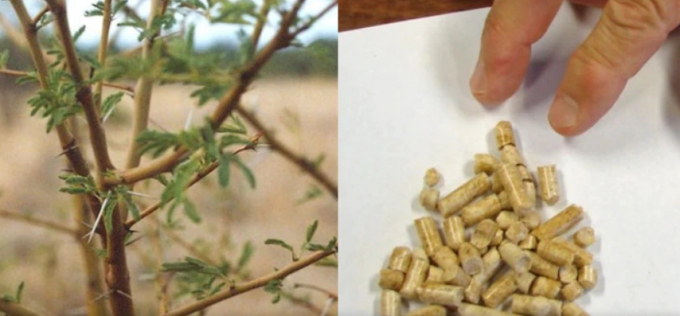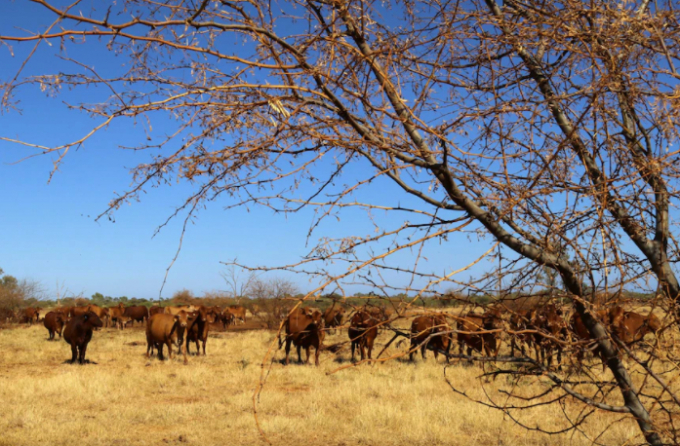June 20, 2025 | 02:22 GMT +7
June 20, 2025 | 02:22 GMT +7
Hotline: 0913.378.918
June 20, 2025 | 02:22 GMT +7
Hotline: 0913.378.918

The renewable energy sector may have found a good use for prickly acacia.Photo: ABC News: Lydia Burton and Rose Grant
You can turn grains and even sugarcane trash into energy, and now there are plans to convert some of Queensland's worst weeds into a new renewable fuel source.
Key points: Invasive weeds could be turned into renewable fuel through the emerging biomass industry; A biomass manufacturer plans to set up three sites across Queensland to produce the alternative fuel source; Prickly acacia is one plant that could be used;
An Australian biomass manufacturer is working on a plan to convert problematic weeds, such as mesquite and prickly acacia, into fuel.
"Biomass is essentially any plant-based material," said Philip Jarratt, the managing director of SEFAAS Proprietary Limited, the company behind the proposed work.
"It can be sugar cane, it can be wheat straw, or it can be forestry waste and residues, or any other type [of] plant material."
Mr Jarratt said the material was then converted into pellets, which could be transformed into renewable fuel.
"A pellet is then blended with coal or used as a 100 per cent substitute to coal," he said.
He said the manufacturer was currently looking at establishing three production sites — in Brisbane, Townsville and Gladstone — with the use of weeds being of particular interest at the Townsville site.
"The invasive weed is a particular feedstock interest for us for the Townsville region at this point in time," Mr Jarratt said.
He said there was especially strong interest in mesquite and prickly acacia.
"There's been a lot of talk about prickly acacia," he said.
AgForce Queensland senior policy officer Marie Vitelli said prickly acacia was an ongoing issue for the agricultural industry, particularly in the north west.
"Prickly acacia is a major curse up in far north-west Queensland and it has also moved down towards the Gulf catchments," Ms Vitelli said.

Mesquite is another weed that could be turned into renewable fuel.Photo: ABC Rural: Eliza Wood
"It's very difficult to manage, especially when it becomes thickened in areas."
Mr Jarratt said he did not anticipate that removing areas of the weed for the purposes of biomass manufacturing would solve the problem for farmers.
However, he said he hoped the work could have some benefits.
"So we're not suggesting at any point that we're the silver bullet or the sole solution; [we're] just happy to be part of the solution," Mr Jarratt said.
"In our way, we focus on what we do and how we'll utilise the [prickly acacia].
"If that allows us to remove some of that infestation from landowners [and] cattle farmers in a way that allows them to regain the productive use of that land, then I think that's a good outcome for the landowner and the resource, and [it's] a viable product for us."
Ms Vitelli said the idea of finding alternative uses for invasive weeds was not a new one, but logistical issues had always gotten in the way.
"Some of this work has been looked at before," she said.
"The main thing is the logistics of processing and where that can be done, and transport costs to where it would be exported or used.
"And that's always been an impediment."
However, she said the work was promising.
"We're seeing a lot of money going into renewable energy, and that would solve a large problem if it's feasible," she said.
"I think many of our western graziers would really welcome prickly acacia becoming a renewable energy resource."
(ABC Net)

(VAN) Poultry production in Poland, which has only started recovering from devastating bird flu outbreaks earlier this year, has been hit by a series of outbreaks of Newcastle disease, with the veterinary situation deteriorating rapidly.

(VAN) Extensive licensing requirements raise concerns about intellectual property theft.

(VAN) As of Friday, a salmonella outbreak linked to a California egg producer had sickened at least 79 people. Of the infected people, 21 hospitalizations were reported, U.S. health officials said.

(VAN) With the war ongoing, many Ukrainian farmers and rural farming families face limited access to their land due to mines and lack the financial resources to purchase needed agricultural inputs.

(VAN) Vikas Rambal has quietly built a $5 billion business empire in manufacturing, property and solar, and catapulted onto the Rich List.

(VAN) Available cropland now at less than five percent, according to latest geospatial assessment from FAO and UNOSAT.

(VAN) Alt Carbon has raised $12 million in a seed round as it plans to scale its carbon dioxide removal work in the South Asian nation.